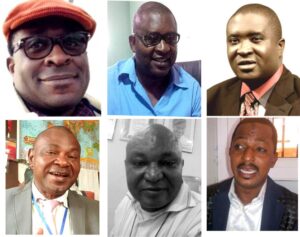
David Etim (Deputy President, Calabar Chamber of CIMA)
It is not that Nigeria is foot dragging. There is a lot of work to be done before you continue to do things. So in terms of value addition which is really what AfCFTA is about, Nigeria has the opportunity of becoming a major stakeholder in African trade. But we also have to put our house in order and putting our house in order requires a lot of things which include physical infrastructures and invisible infrastructure. These are all the factors militating against Nigeria taking full advantage of the situation. It is not a web of activities. A lot of things have to happen the right way.
Mr. Pius Ujubonu (ANLCA Interim Chairman)
Before we start talking about Nigeria foot-dragging, we need to try to find out the policy architecture in the transportation industry. What is the information level of the technocrats within the relevant industry? How in-depth are they in interpreting the transportation policies? What is the government’s long or the short term road map towards achieving transportation? By the time you access these things, you would be able to either blame or pity the industry itself. The bane of Nigeria generally not even in the transportation industry alone, is using round pegs for square holes. Majority of the people who are supposed to steer the ship of that policy architecture are not even properly informed. Apart from rhetoric, the actual implementation requires experts, but you don’t find them around the areas. Those who know it are not even brought on board. Nigeria has not even started. Using the word “foot-dragging” is even putting it mildly. We have not begun. When we begin we would know.
Francis Omotosho (Acting Secretary General, NAGAFF)
If Nigeria actually wants the concept as projected by the entire African countries with regards to AfCFTA, by now, Nigeria would have withdrawn their normal order of target or projection given to Customs to raise money at the expense of the citizens. To me, the Nigerian government is not yet ready. We have very good concepts in Nigeria with so many semantics in anything we want to do. But when it comes to the reality of action, Nigeria is not yet ready. They want to continue to get three to four trillion naira from Customs through duty. Kenya, Rwanda, Ghana and other countries have already started doing business under AfCFTA. I don’t really think Nigeria wants AfCFTA. They just signed the agreement physically; just to let people know that they are in the spirit, but in the actual sense of it Nigeria doesn’t want AfCFTA.
Stanley Ezenga (Former PRO, NAGAFF)
Nigeria is not prepared. We are not positioned to operate in AfCFTA. Nigeria is almost the pioneer country that initiated this agreement but along the line, Ghana and other countries overtook us in their preparation. Nigeria knows that if the Agreement kicks off today, we would be at the losing end. To gain maximally from AfCFTA, we must have exportable goods, that is, goods that can be exported and accepted. In that area, Nigeria is still lagging behind. We need to organize our exports in such a way that our goods can be acceptable outside our shores. If this is not done, Nigeria will become a dumping ground, while our goods would not be accepted by other countries. We have to put our house in order by packaging our goods to be appealing to others. Nigeria is not ready or prepared.
Festus Ukwu (National Secretary, NCMDLCA)
Nigeria is not a straightforward country where you can determine to do something. The government is only concerned with where they can make money and cheat. We don’t have a good government with good administrative strategy. The people at the helm of affairs don’t want these things to work. It is political nothing else.
Dr. Segun Musa (Deputy National President, Air and Logistics, NAGAFF)
If you look at the policy drive towards the implementation of the agreement, you wILL realize that Nigeria is not putting anything on the table. Other countries moved to the drawing board to start projecting the motive force to drive this agreement when it was signed. They created an enabling environment and capacity to benefit from the agreement, except Nigeria. There have been so many jamborees by Nigeria government and their consultants towards the implementation and participation in that agreement and since then, nothing has been put on the table critically to show that Nigeria is serious about the agreement. Looking at the Nigerian policy framework, you will realize that the Nigerian Customs is not interested in that agreement, because they have a target to meet and probably out of suspicion, they feel the agreement would affect their targeted revenue.
Kindly like us on Facebook/twitter















